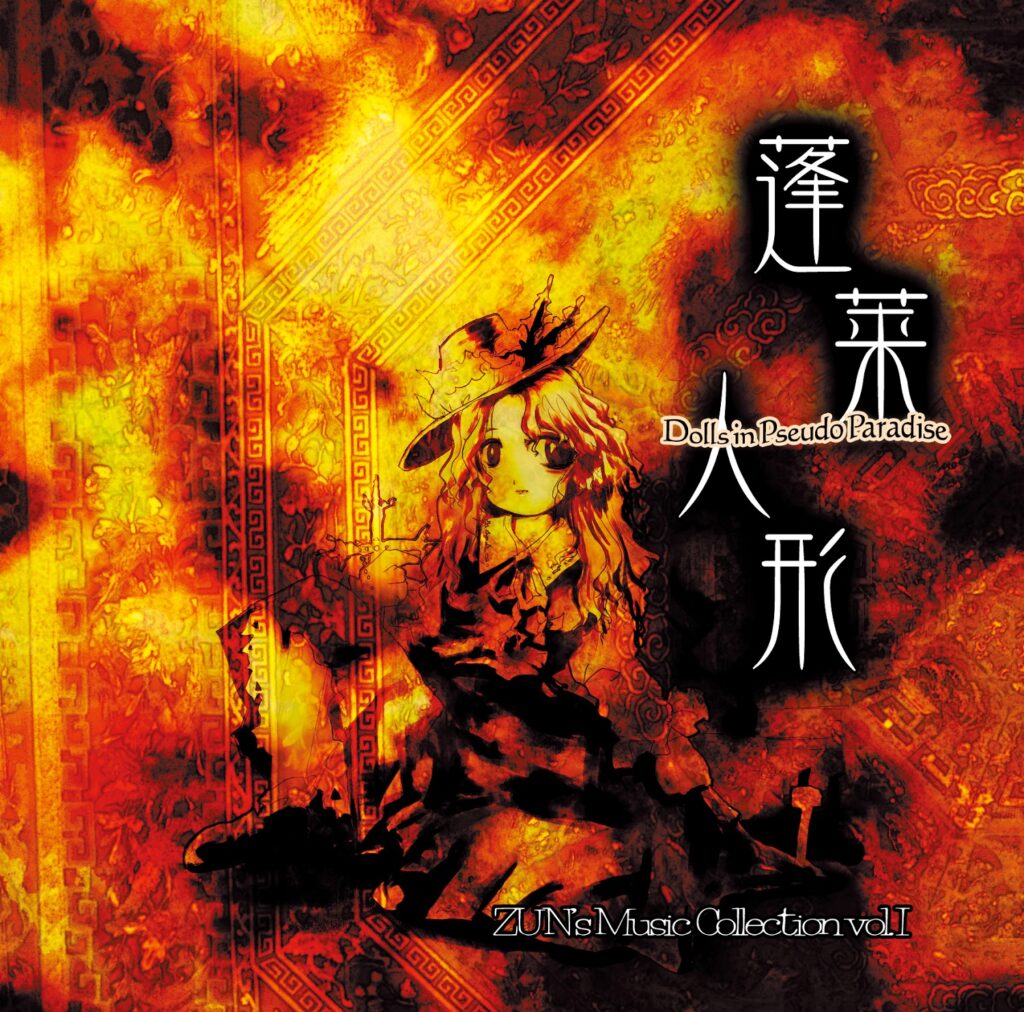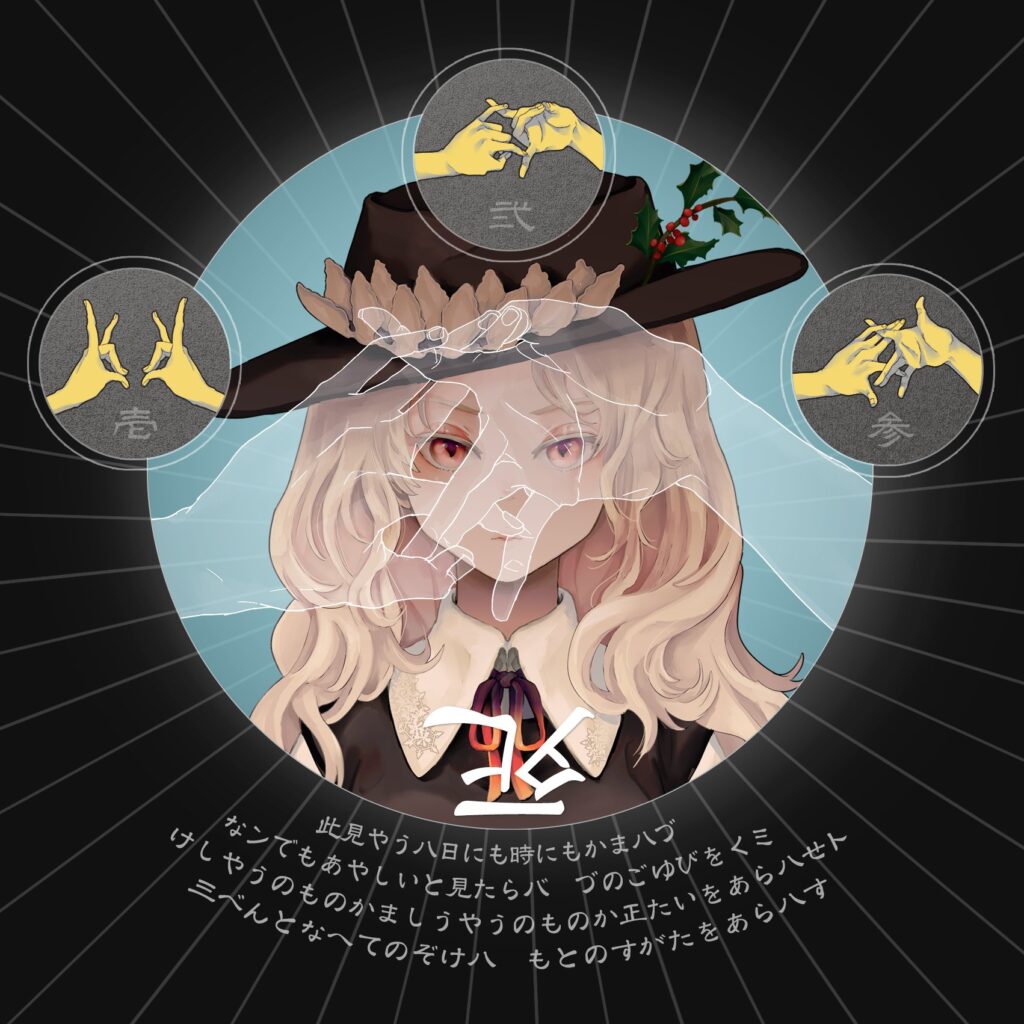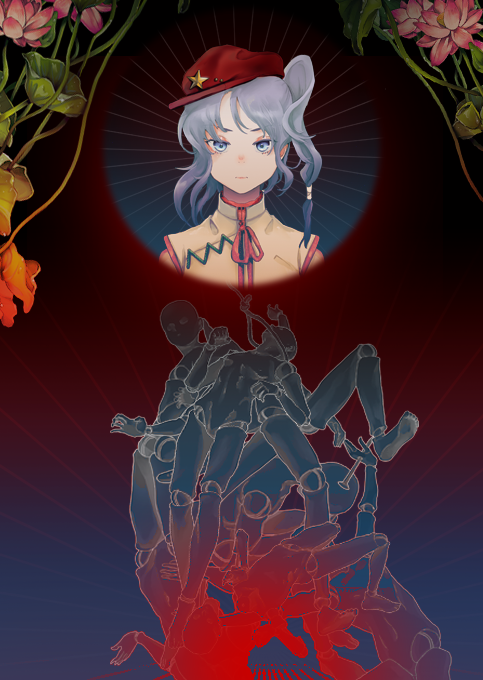Before starting, I want to tell you that this post is divided into two parts. The first one is a rant about how I am disappointed that a certain theme is not in the album, and you are free to skip it (I admit myself it’s pretty stupid), the second one is the proper analysis. Prepare yourself, because it’s a very long one!
Boooo, I wanted Enigmatic Doll!!!!11
Those who know me might be aware that my top 2 favorite ZUN compositions are Witch of Love Potion and Enigmatic Doll. For the former, I don’t search for arrangements of it, because the DiPP version is perfect, but for the second one… Well, you know, it’s Muse Seihou’s theme, my favorite character ever. She is the embodiment of the music I love, and the one who deserves better arrangements. Her theme is that one theme I wish BUTAOTOME would arrange one day, but I knew it would never happen due to Seihou’s extremely low popularity. But when we learned, through Ane’s teasers, that the album would have been DiPP-based, I was extremely excited and ready with all the memes. “Muse has her Buta song now!”, Comp and Ranko being added to the “list of arrangers and vocalists to respect because Enigmatic Doll”, “hey, we are getting a fifth vocal arrangement, and…. excuse me, did my kanji knowledge get rust or I read… Pig… Girl?”, a dream that came true after 9 years. However, a voice on my mind told me to keep the expectations low. And I wish I could have listened to it. When I read the tracklist… the hype slowly disappeared. No Enigmatic Doll. And neither Witch of Love Potion, because guys, Flower of Japan and U.N. Owen are much more important. I know I said that I don’t care for arrangements of WoLP, but I would have been still happy, my favorite theme arranged by my favorite circle!! I was so disappointed, and because of this, I wasn’t able to enjoy the XFD on my first listen. While I admit the salt is still there, I have been appreciating the sample (and the album in general) more and more from further listenings and researches. Once again, XFDs suck!!111
Looking at the other three excluded DiPP songs in the album, I can understand why they aren’t here. Dichromatic Butterfly and Eternal Shrine Maiden are not originals, and Buta had a lot of chances to arrange them as Reimu songs for any other album (tho, I could say the same thing for Flower of Japan and U.N. Owen, maybe they are here due to their relevancy to the story. Flower marks the “death” of the most beautiful honest (wo)man, while U.N. Owen has the whole “and then there were none”/the culprit was her?!!?!? key moment). Forest of Dolls sucks and I still can’t remember how it sounds.
I think Witch of Love Potion and Enigmatic Doll tracks could have been perfect for this album, maybe Buta tried to make a song with them, but scrapped ’em because they didn’t turn out good. Or more simply… they didn’t even consider them, or they just don’t like those songs. After all, I don’t think there is anyone who loves absolutely everything and anything ZUN puts out. But I’m not in their mind, so it’s useless to speculate about “why this theme is not here”. And most importantly, themes alone are not what makes a Touhou album good.
….now what if they excluded Enigmatic Doll because they are saving it for a Seihou album, I mean, Muse is one of the most interesting characters, if you are going to arrange Enigma then it’s better to have it as a song about the actual owner of the theme, I have a lot of ideas about her to fill an entire album, if you want to talk with me you can find my contact page at the to-
Kochuuten analysis – “Oh, you tragic things…”
And now, to the main reason why you are probably reading this post (unless you love rants and stupid complaints).
Kochuuten is the first BUTAOTOME album we get after Paprika left. It marks the beginning of a new era for the Pig, so I think it has to be a very impactful release. It will show a lot of people how they are now.
Dolls in Pseudo Paradise was ZUN’s first proper work after the PC-98 era (along with Embodiment of Scarlet Devil), so in a way, it fits to be the main motif of a new starting point.

For those who are not into the Touhou lore, Hourai Ningyou ~ Dolls in Pseudo Paradise is the 1st CD of the ZUN’s Music Collection series. It stands out among all the others for being the only one to be completely unrelated to Renko and Merry. It also has 2 versions: the C62 one (which it’s sold for 5 million yen on Surugaya) and the C63 one, which is the one you can easily find in doujin shops. They are the exact same thing sound-wise, the main differences are a slightly different cover art, the C62 disc featuring an illustration of an entirely different girl, and two completely different stories in the booklet. The C62 story is about eight honest men who get spirited away in Gensokyo, and die one by one until no one is left… but in the end, it seems one of them survived and was behind all the deaths. These eight no-name characters have no official art, and the real identity of the girl on the cover is unknown, but the general fandom consense is that she is “the most beautiful one” of the group (there was only one girl in the group, but it’s only revealed in the end) and the mastermind. I suggest reading the story, it’s pretty good, tho it’s essentially a Touhou version of And Then There Were None. The C63 “story” consists of much smaller text parts seemingly without any connection between each other, and unrelated to the previous version.
DiPP has its small dedicated fanbase, with the cover girl (who for convenience’s sake I’ll refer to as “Adelina”, a name I gave to her) and her best buddy from the C62 disc (I don’t have any name for her, I don’t care about her, sorry) getting fanarts and fanworks. Arrangements are pretty uncommon, some circles put Legend of Hourai and other tracks in their RenMerry albums despite being completely unrelated to the Hifuu Club. There are some full Hourai Ningyou albums out there, but they are instrumental. Vocal arrangements are pretty rare, especially those that reference the stories. If Diao ye zong’s Hofuri, with its tracks Bohyou and Sougei, can be considered as the Old Testament of DiPP fan music (and it was also the entry point to its world for a lot of people), Kochuuten (being the first full vocal album) can be the New Testament.
Now, am I a DiPP fan? Yes, but not of the fanatical type. I really like the album and I rank it very high in my top ZUN albums, even above most of the Hifuu stuff. I don’t actively search for fanworks about it, but if Adelina pops up in my timeline, I always appreciate it. DiPP arrange albums stand out only if they have Enigmatic Doll, otherwise, I just ignore them. So my commentary won’t be from a DiPP fangirl standpoint (who would probably consider this album as the best thing ever made) but as a long-time BUTAOTOME fan who loves to analyze their works and the details and references to the original works they put every time.

Now, to the album itself, starting from the title! It literally means “heaven in a pot”. It’s an expression used for a different world, but can also be used for “drinking and forgetting the mundane world”. Because remember, drinking is what moves the Touhou world!! Jokes aside, the title was chosen for a reason tied to Dolls in Pseudo Paradise itself. On the back cover of the original album, there is a round gate that brings to a garden with “壶中天” (its Chinese variant) written above it (third picture on this page). It’s like a small window to a new world, and it can refer to the hole in the peach tree that brought the eight honest men to Gensokyo.
Design-wise, this album is gonna be one of Ane’s best works, the illustrations are very high quality! While PC-98 Reimu, representing the Hakurei shrine maiden, is in the cover art, Adelina is on the back cover.

The text on the image and the hand gestures refer to a technique called “fox’s window/kitsune no mado”, which was used to see the true form of youkai disguised as humans. There’s an imposter among us. There is also a pun with the number 4 and the word “death” (both pronounced “shi” in Japanese).

Ane also posted this other illustration (which will probably be somewhere in the booklet) featuring the C62 disc girl, and a pile of dolls representing the dead honest men, and how they died.
Now it’s time to talk about the music and… oh my. This is gonna be one of the darkest BUTAOTOME albums ever. Ranko went fully edgy here (she wrote most of the lyrics, Ane wrote 2 songs, and Comp only the last one). There is no happy and optimistic track, and the general sound from the XFD is pretty heavy. The lyrics are all about the original DiPP story, so the main topics are “the darkness of the heart, choosing the dark path, and leaving behind the good in life”.
Time for a track by track review, featuring translations of the XFD lines by the Anonymous Karakasa!
ekadanpi is a kick-ass intro that gives some Rage Against The Machine-vibes. It’s from the viewpoint of the most cowardly honest man, who tried to hang himself but ended up failing and being reborn. The title is a four kanji compound for “to show a great determination” or “to express a passionate desire to seek the truth”. Huike (Eka) was a high priest of the late Northern and Southern Dynasties in China and the second founder of Zen Buddhism. He wanted a teacher to “open the gate of the elixir of universal compassion to liberate all beings”, but Bodhidharma refused. So Huike cut off his arm (Danpi) as proof of his determination.
I see two chain knots. They twine themselves around my vision so I don’t notice.
Is this the correct thing? Is this the wrong thing? There’s no way home.
Eyes and ears, front and back, bodies, soles – It all makes perfect sense.
You and I are distorted. Don’t tell me we got found out?!
I loose my nerves and break into a run. There’s no use adding more to my pile of shame.
You don’t understand a thing! I hang myself, but the rope snaps.
I pretend to be a human and am born again.
Gizensha (Hypocrite) is a track I have a hard time understanding from the sample alone. It might be about the coward man as a reborn person and after he ended up being the last honest man remaining. In the original story, Reincarnation is the track where the wariest one dies. We’ll see with the full thing! The shalalala must have a creepy meaning…
You wouldn’t mind if I tried putting it into words, right?
How disappointing; I wanted this to go on for longer.
“Well, that’s life for you”, someone just laughed.
Farewell to everyone’s paradise and those peaceful days.
HARI HARUHARI (wtf is this title) reminds me a lot of Yurikago no Naka de, Sei, and similar tracks, and it’s pretty much the ending of DiPP’s original story, with the Hakurei shrine maiden talking about Adelina going away from Gensokyo and (from the bit that was not in the official lyrics XFD) how it’s the usual boring stuff. Seven people died here, it’s nothing important ¯\_(ツ)_/¯
The blonde hair I’ve already seen somewhere before sways.
The girl heads toward the exit. “Farewell”, she laughs.
Shoujiki mono A no Dokuhaku (Honest Man A’s Monologue) marks Ane’s comeback to lyrics writing! This song is probably from the viewpoint of the most curious one of the group, as it expresses a big desire to “seeing this paradise”, and he dies in the story part of the original theme. The letter “A” could be a reference to the fact he is the first one (to be both introduced and dead).
But I still want to see it, I want to see more of this paradise filled with the scent of peaches
I want to see it right now, I want to see it with everyone
Before you transform.
Hakidasu Aka (vomiting filth) seems related to the party they have in the Meiji 17 part of the story (this is also the part where the youngest one dies). It might also refer to the party mentioned in the C63 version. The kanji 垢 is mostly used for dirt that comes from the human body, but it’s also a slang term for an Internet account (and this seems to be its main meaning nowadays). If pronounced as “ku”, it refers to the kleshas from Buddhism. Perhaps it’s “forcibly remove/spit out all your dark thoughts”? By the way, this track is my favorite track from the XFD, with its “tragic carousel” vibe and Ranko’s rrrr which is always accepted.
Now dance on this path where no light shines – Just live until you die.
Front and back, a paper-thin difference. In the human world, “to be” and “to be not” are one and the same.
Kichi no Soto (beyond understanding) (hey, it’s the sachlich track) is probably about the earliest riser of the group, who dies in the U.N. Owen part while realizing that the culprit behind all the deaths is one of them.
The more I hope for this to be a dream, the more everything is beyond my understanding.
I abandon such a comical and funny thought now that there’s no path I can take.
Behind the trap I fell into is the hell which is clad in the skin of “future”.
Shokuchuuka (Insectivore flower) is Flower of Japan so it’s an automatic skip for me is the other track Ane wrote lyrics for, and it’s… basically a murder/sadistic song. At first, I thought it was just an edgy Yuuka song, but I think it might be under the viewpoint of Adelina/the most beautiful one since she “dies” in Japanese Flower and she is the one who killed everyone.
The flower of death which was captured as it bloomed, spans over the romance of fate.
The final escape route is closed off. If you drowned in its sweetness…
You’ll melt!
And to end the album, we have Arifureta Inochi (ordinary life), an acoustic guitar ballad. When was the last time we got a slow acoustic number from BUTAOTOME, excluding rearrangements? It gives the feeling that no one is left here (inb4 the full version adds all percussions and Comp guitar riffs). This is the only track with Comp lyrics here, and despite the original theme being Circus Reverie, it’s more about the Dichromatic Butterfly part of the story, with rain and the shrine maiden dancing above the lake. But we’ll see with the full version…
Rain falls into these ordinary days.
I was enchanted by the view of you dancing on the water’s surface and the interception of sound.
I turn away from ordinary lies.
I cheat the night and dream about waiting for dawn.
Overall, I’m pretty excited about this album. I have a small fear that it might turn out to be not that interesting due to its limited source material and the possible excessive edginess, but I’m still looking forward to it. It’s still some good Pig music! I also hope Kochuuten will give even more exposure to DiPP, I think it’s one of the best ZUN albums (despite having some noticeable flaws other CDs don’t have), and it’s much more than “hey, thanks to this album I can buy U.N. Owen on iTunes!!”.
And that’s all I had to say about the Pig’s new work! I’ve pre-ordered it (along with Adelina’s pass holder), and once I’ll get it I’ll start all the transcription/translation/review works. I’ll also keep an eye on the three members’ social media, hoping that they’ll share more interesting info and trivia about it (probably through Fanbox). Stay tuned!
Now, what about you? What do you think about this album? Do you love dark BUTAOTOME or prefer when they do lighter stuff? Are you a DiPP fan or are you discovering it through Buta? Let me know in the comments! ☕